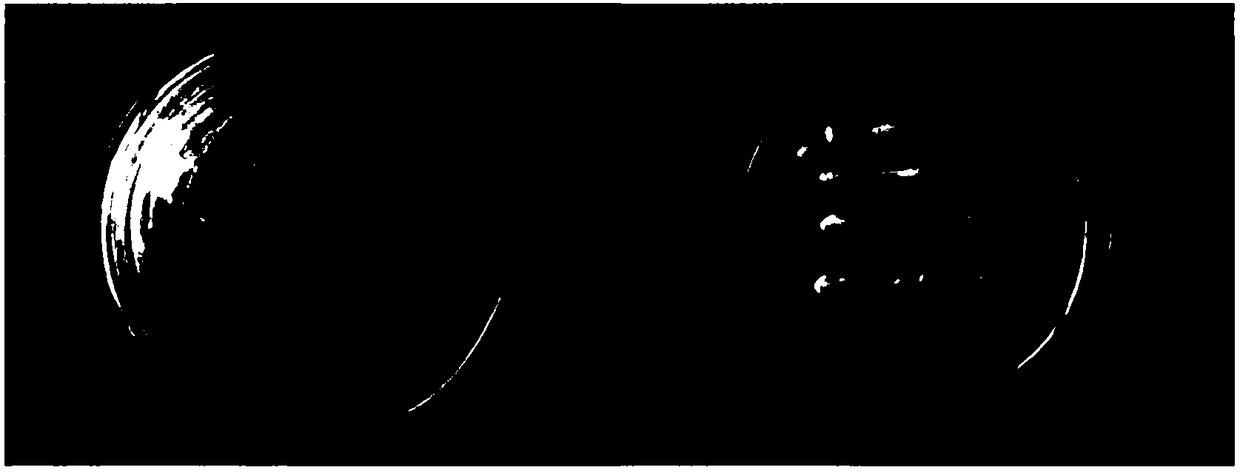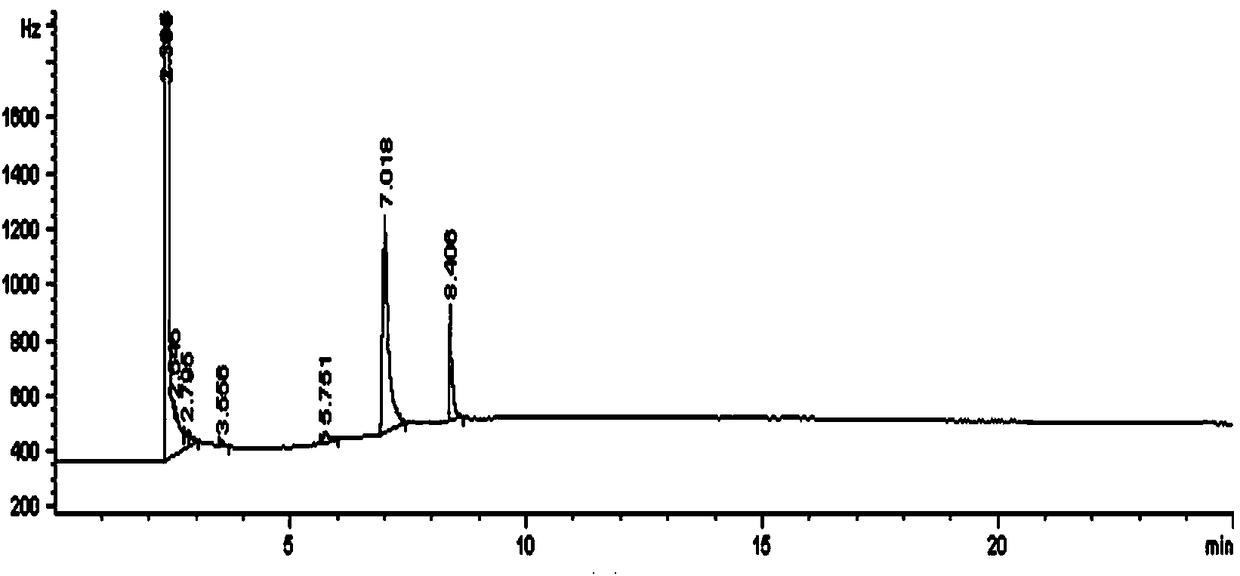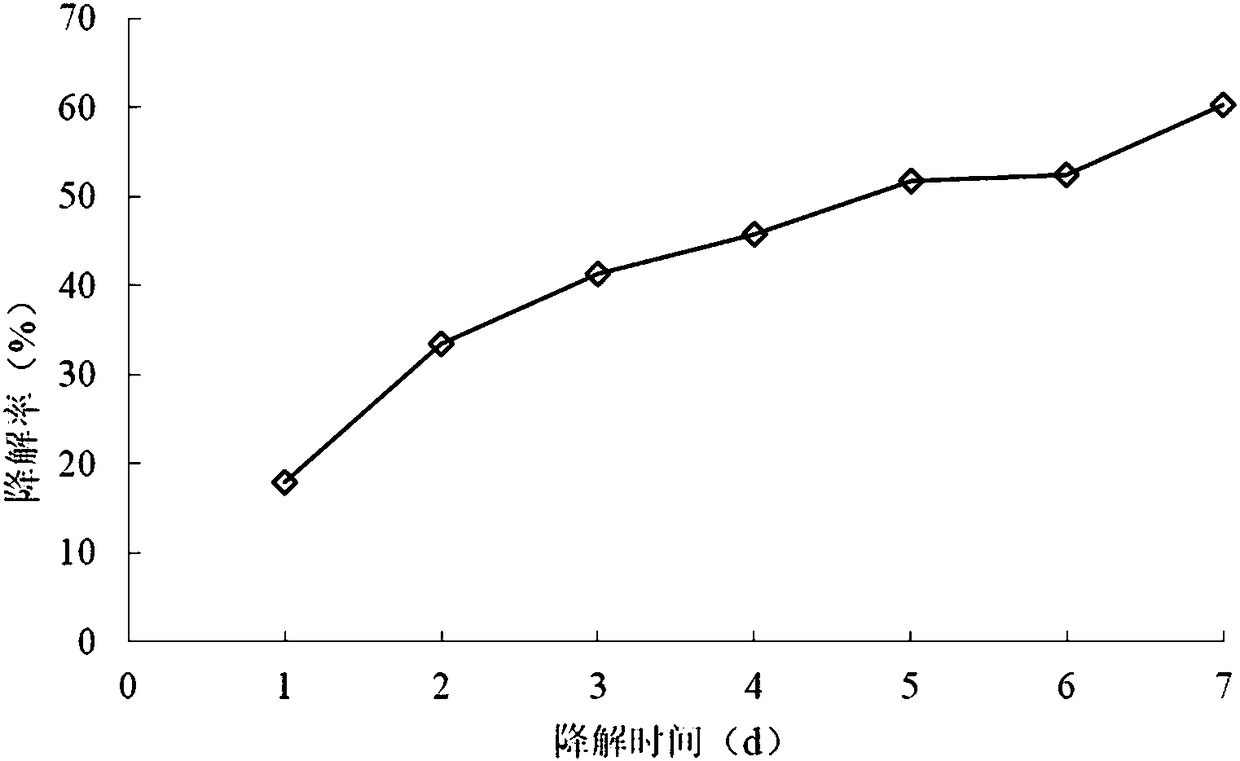Brevundimonas naejangsanensis J3 and application thereof
A technology of bacteria strains and bacterial agents, applied in Monospora J3 and its application fields, can solve problems such as bioremediation of pesticide residue pollution, and solve the problem of excessive pesticide residues and environmental pollution. It is easy to use and efficient in production. low cost effect
- Summary
- Abstract
- Description
- Claims
- Application Information
AI Technical Summary
Problems solved by technology
Method used
Image
Examples
Embodiment 1
[0022] Embodiment 1: Isolation and identification of monosporus bacterium J3
[0023] 1) Isolation and screening of Monospora J3
[0024] Weigh 10.0g of soil polluted by sclerotia for a long time and place it in a 250mL Erlenmeyer flask, add 100mL of sterilized inorganic salt medium, add pesticide standard sample to 25mg / L, place on a shaker, and set the temperature at 30°C and 150rpm Under the condition of shaking culture 5d. Take 0.5mL supernatant from the culture solution and put it in a new inorganic salt culture solution containing 25mg / L pesticide, cultivate it under the same conditions until the culture solution becomes turbid, then take the supernatant and inoculate it in a new culture medium with 10% inoculation amount. Culture solution, repeat the above operations, and gradually increase the concentration of pesticides to 1000mg / L (pesticide concentrations are respectively 25mg / L, 50mg / L, 75mg / L, 100mg / L, 1000mg / L), to obtain enriched degrading bacteria liquid .
...
Embodiment 2
[0049] Embodiment 2: the preparation of degrading bacterium monosporum J3 preparation
[0050] 1) Preparation of liquid degrading bacterial agent
[0051] Including the following steps:
[0052] (1) Inoculate 5% of the bacterial suspension of the monospora J3 strain in the beef extract peptone salt medium, and vibrate at 30° C. for 6-13 hours at 150-200 rpm to obtain strains.
[0053] (2) The bacteria were inoculated into the seed bottle at an inoculation amount of 1% of the volume ratio of the beef extract peptone salt medium, and cultured by shaking at 150-200 rpm at 30°C for 6-13 hours to obtain a seed liquid.
[0054] (3) Inoculate the obtained seed liquid into the fermentation medium (maltose 7g / L, yeast extract 8g / L, sodium chloride 3g / L) according to the inoculum amount of 10% volume ratio, at 30 ℃, 150~200rpm Ferment and cultivate for 13-14 hours to obtain a fermented broth (OD600 greater than 20), and directly dilute the fermented broth to obtain J3 liquid bacterial...
Embodiment 3
[0060] Embodiment 3: Degradation bacterium J3 is to the degradative effectiveness of sclerotium net
[0061] Add sclerotium in the inorganic salt medium (with embodiment 1), make its final concentration be 50.0mg / L; Add appropriate amount of thalline in the inorganic salt medium containing sclerotium 50mg / L, adjust its OD600 to be 0.2 , cultured in a shaker at 30°C and 150rpm for 7 days, and samples were taken every 24 hours to determine the degradation ability of the strain. The non-inoculated inorganic salt medium added with the same concentration of pesticide was used as the control.
[0062] Apply gas chromatography to measure the residual amount of sclerotia net and calculate the degradation rate, the results are as follows: image 3 As shown, the results show that the degrading bacteria J3 can effectively degrade sclerotia in a short period of time, the degradation rate of 50.0mg / L sclerotia in 5 days reaches 51.65%, and the degradation rate of sclerotia in 7 days reach...
PUM
 Login to View More
Login to View More Abstract
Description
Claims
Application Information
 Login to View More
Login to View More - R&D
- Intellectual Property
- Life Sciences
- Materials
- Tech Scout
- Unparalleled Data Quality
- Higher Quality Content
- 60% Fewer Hallucinations
Browse by: Latest US Patents, China's latest patents, Technical Efficacy Thesaurus, Application Domain, Technology Topic, Popular Technical Reports.
© 2025 PatSnap. All rights reserved.Legal|Privacy policy|Modern Slavery Act Transparency Statement|Sitemap|About US| Contact US: help@patsnap.com



